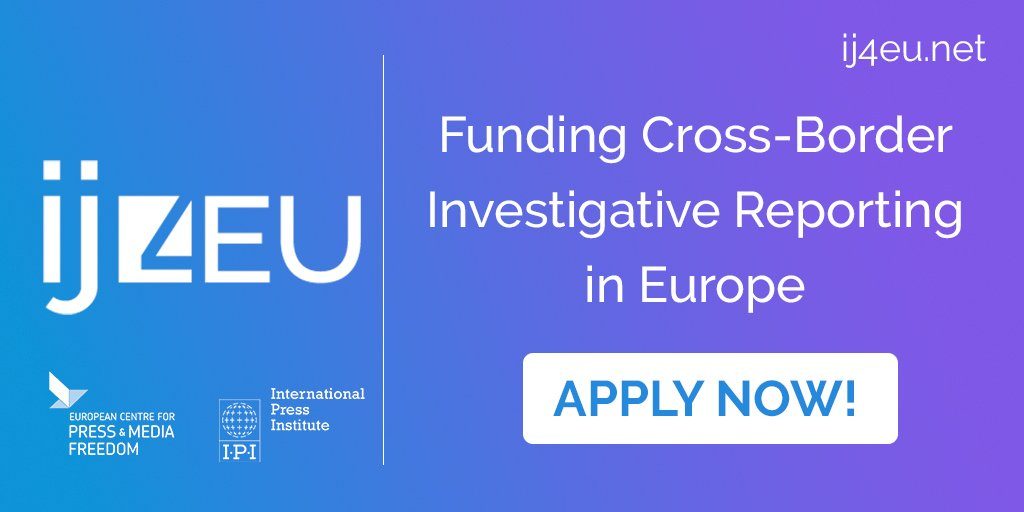Deadline: May 3, 2018
The Investigative Journalism for the EU (IJ4EU) Grant 2018 is now open for applications. IJ4EU grants are intended to foster and strengthen collaboration among European Union-based journalists and newsrooms on revelations in the public interest and of cross-border significance. The grant aims to support investigations that reflect the media’s watchdog role and that assist the public in holding those in power accountable for their actions and to their obligations. In so doing, it seeks to contribute to the sustainability of democracy and the rule of law in the EU.
The grants are administered by the International Press Institute (IPI), based in Vienna. Founded in 1950, IPI is a global network of editors, journalists and media executives dedicated to furthering and safeguarding press freedom, promoting the free flow of news and information, and improving the practices of journalism.
Assisting IPI’s grant administration in an advisory capacity are George Brock, journalist and visiting professor at City, University of London, and Nils Mulvad, editor at Kaas & Mulvad. Funding for the grant comes from the European Commission through the European Centre for Press and Media Freedom (ECPMF), based in Leipzig.
Funding
In 2018 teams of investigative reporters in at least two EU countries can apply for grants up to a maximum of €50,000.
Eligibility
- Applications must be sent by teams of at least two media outlets and/or journalists and based in at least two EU member states on a topic of cross-border relevance.
- The proposed project must aim to reveal new information. Applications must justify the relevance of the investigation for the public in the target countries or for the broader European public sphere. Investigative teams already in existence or formed for an #IJ4EU project are equally welcome to apply. Ongoing but incomplete investigations are eligible to apply for funds to complete a publishable story.
- The programme will consider funding all platforms, including print, broadcast, online media, documentary filmmaking and multi-platform story-telling.
- Proposed projects must aim to be published (and available in publishable form) by respected news outlets or platforms in at least two EU countries no later than December 31, 2018. Projects may initially be published behind a paywall, but must be made available outside of the paywall after a month.
Projects on the following broad themes will have priority:
- Corruption, illicit enrichment and financial crime
- Security, democracy and human rights
- Environment and climate change
Proposals on other topics will be considered.
Projects must examine an issue that is of relevance to the public in at least two member states or to the wider EU public sphere. While the fund aims to support investigative journalism across the EU, it will give special consideration to projects in two areas:
- Investigations involving news organizations based outside of the capitals or largest cities of EU member states
- Investigations in countries where investigative journalism is under pressure, including financial and political pressure
Criteria
The jury’s decision will take account of, but not necessarily confine itself to, the following criteria:
- Cross-border relevance
- Relevance of topic to European and local public
- Newsworthiness and added value
- Strength of research and publication plan
- Expected impact and/or reach of the project
- Feasibility of project within project timeline and budget
- Applicants’ experience and journalistic credentials
- Financial need
Application
Applications for an IJ4EU grant must be submitted in English and include:
- Detailed description of the proposed project, highlighting its cross-border relevance and public relevance. It is understood that this will be an outline of what is intended as a result of a hypothesis, tip or leak. Those selecting projects for grants will need as much information as possible to assess the strength and viability of a plan but appreciate that there are aspects of investigative work that cannot be disclosed in advance.
- Background of the applicants. Individual journalists and filmmakers will be asked to provide the names of two referees that can be contacted by IPI together with a CV/summary of past work. Media outlets will be asked to provide the names of two independent experts who can speak to the media outlet’s journalistic credentials or provide other information that allows IPI to assess those credentials.
- A research and publication plan, describing the expected timeline for the investigation and the media outlets or platforms in which the project will be published, and the expected publication date (projects must be published no later than December 31, 2018). Individuals, such as freelance journalists or documentary filmmakers, must provide a letter of intent from media outlets or platforms in at least two countries indicating that they are willing to seriously consider publication of the project.
- A detailed budget that falls between the minimum and maximum grant amounts (see above). As the IJ4EU grant will cover 70 percent of eligible budgets, applicants should indicate the sources of funding for the remaining project budget (e.g., self-funding, in-kind contributions, external funding). The budget does not need to specify in detail items which need to remain confidential during an investigation. Grant recipients will have to provide accounting (without naming sensitive sources) after the project is completed.
- A risk assessment, highlighting in particular how applicants plan to address any problems emerging from cooperation among journalists working in different countries as well as any other risks emerging from the particular topic proposed.
Applicants should be aware that legal compliance and legal risk management are the responsibility of the reporters and/or the publisher.
Successful applicants will be notified no later than June 15, 2018. Applicants will be required to sign a contract with the International Press Institute in order to receive the funds. An initial pre-funding amount equal to half of the total grant budget will be paid to the grantees upon contract signing. The remaining amount will be disbursed to the grantees upon fulfilment by the grantees of the grant requirements.
For more information, visit IJ4EU Grants.

